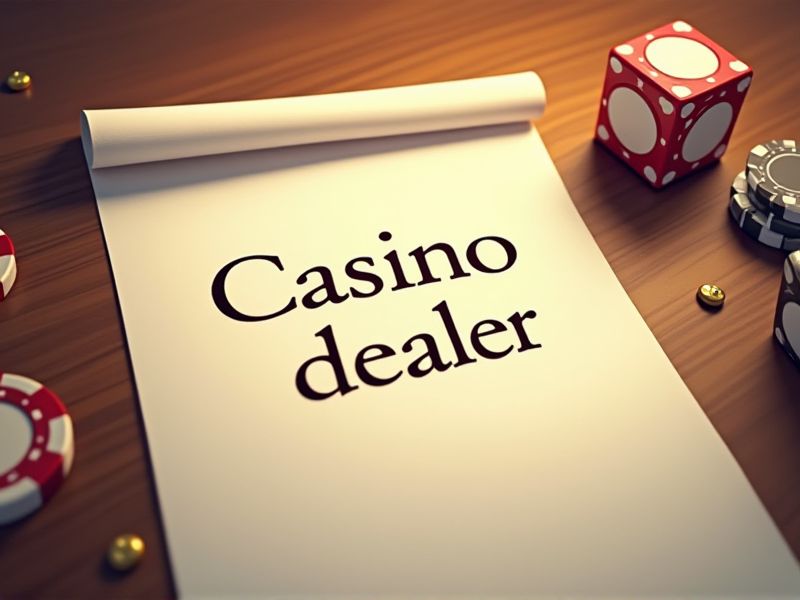
Casino dealers hold the responsibility of managing gaming tables and ensuring fair play, which necessitates a solid understanding of game rules and casino operations. Certifications equip dealers with the necessary skills to handle complex gaming situations and manage customer interactions effectively. Adhering to specific regulatory requirements and certifications demonstrates compliance with industry standards and enhances a dealer's credibility. Here's a closer look at important certifications you might need to pursue a career as a Casino dealer.
Gaming Commission License
A Gaming Commission License ensures that casino dealers meet legal and ethical standards, reducing the risk of fraud and misconduct. It establishes trustworthiness, allowing players to feel secure in the fairness of games. Regulatory oversight minimizes chances of illegal activities like money laundering. Licensing facilitates compliance with state and federal regulations, avoiding potential fines and legal issues for the casino.
Casino Dealer Training Certification
Casino dealer training certification ensures a standard level of skill and knowledge, which enhances service quality and customer satisfaction. Certification reduces errors and increases efficiency, contributing to a smoother gaming experience and higher revenue for casinos. Regulatory requirements often mandate certified training for dealers, ensuring compliance with legal standards. Certified dealers are perceived as more professional and trustworthy, which improves the casino's reputation and attracts more patrons.
Table Games Dealer Certification
Obtaining a Table Games Dealer Certification ensures that the dealer has proper knowledge and understanding of various casino games, which is crucial for maintaining fair play. This certification also verifies the dealer's proficiency in handling chips and cards efficiently, contributing to overall gameplay integrity. Casinos require certified dealers as part of their regulatory compliance to meet industry standards and legal requirements. Certification boosts a dealer's employability and credibility, as it signals to employers that the dealer is well-trained and competent in their role.
Blackjack Dealer Certification
Obtaining a Blackjack Dealer Certification equips dealers with essential skills and knowledge, ensuring they maintain a fair and consistent game environment. The certification process often includes learning casino rules, game mechanics, and customer service, which enhances the overall gaming experience for players. Certified dealers are more likely to gain employment, as casinos prioritize hiring staff who meet industry standards and can contribute to a reputable gaming atmosphere. Certified dealers tend to reduce instances of game errors and disputes, promoting a transparent and professional operation.
Roulette Dealer Certification
Roulette dealer certification is needed to ensure dealers master the rules and techniques critical to maintaining game integrity. Certified dealers are better equipped to handle the challenges of casino regulation compliance, minimizing the risk of operational penalties. Proper certification is crucial for fostering trust among players, enhancing their overall gaming experience. Through certification, dealers acquire skills in managing high-pressure situations, reducing potential revenue loss from errors.
Poker Dealer Certification
A Poker Dealer Certification ensures a dealer possesses a comprehensive understanding of game rules and casino regulations, which directly impacts the fairness and integrity of the game. Certification programs provide training in procedural accuracy and customer service skills, both critical for smooth game operations in a casino setting. Casinos demand certified dealers to minimize errors and disputes at the gaming table, thereby enhancing player satisfaction and trust. Certified dealers often find more job opportunities, as casinos generally prefer employing those who have proven their competence through recognized certifications.
Money Handling and Cash Management Certification
A certification in money handling and cash management equips casino dealers with essential skills to accurately manage and process large volumes of cash transactions. Training reduces the risk of errors or fraud, ensuring financial integrity within the casino. Skilled cash management by dealers contributes to smoother operations, enhancing customer trust and satisfaction. Certification enhances a dealer's credibility and career opportunities in a competitive industry.
Responsible Gambling Certification
Responsible Gambling Certification is crucial for casino dealers because it equips them with skills to identify and support players exhibiting problematic gambling behavior, ensuring player safety. It fosters a culture of responsibility and trust, enhancing the casino's reputation and customer experience. The certification helps dealers comply with legal and regulatory obligations, reducing the risk of potential fines or legal issues for the casino. It also empowers dealers to contribute to the community's welfare by promoting healthy gambling practices, mitigating societal issues related to gambling addiction.
Customer Service Excellence Certification
Obtaining a Customer Service Excellence Certification enhances a casino dealer's communication and interpersonal skills, leading to improved guest experiences. The certification often results in increased trust and satisfaction from patrons, which can contribute to higher customer retention rates. Certified dealers are better equipped to handle conflicts and create a positive atmosphere on the gaming floor, directly influencing revenue through repeat business. Therefore, the certification provides dealers with a competitive edge and fosters a culture of professionalism within the casino environment.
First Aid & CPR Certification
Casino dealers work in environments with a large number of patrons, increasing the likelihood of medical emergencies. First Aid and CPR certification equips them to respond quickly to incidents such as choking or cardiac arrest on the gaming floor. Patrons often include individuals with pre-existing health conditions, necessitating immediate intervention in certain situations. Awareness of basic first aid ensures that any medical delays are minimized, potentially saving lives before professional help arrives.
Summary
When you, as a casino dealer, obtain certifications, your credibility and professionalism are enhanced. This can lead to increased job opportunities and the potential for higher salaries. Casinos may view certified dealers as more knowledgeable and trustworthy, which can improve customer satisfaction. Your expertise can also contribute to smoother operations, minimizing errors and disputes at the gaming table.
